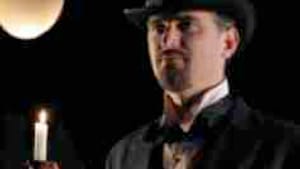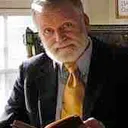Stay in the Loop
BSR publishes on a weekly schedule, with an email newsletter every Wednesday and Thursday morning. There’s no paywall, and subscribing is always free.
Redemption for Madoff in 2011? Or: Reflections on the American Scrooge
Scrooge vs. Madoff: A distant mirror

The similarities between two notorious symbols of greed— the fictitious Ebenezer Scrooge and the real-life Bernard Madoff— seem obvious enough. Scrooge, the protagonist of Dickens's 1843 tale A Christmas Carol, milked the system for all he could get out of it. Madoff, the money manager turned con artist, induced thousands of friends and clients to trust him with their life's savings by fraudulently inflating the returns he was supposedly delivering to them.
Both men focused entirely on money with total disregard for anyone but themselves. In their relationship to society, both men function as "the ogre of the family," as Dickens put it.
But the differences are obvious, too. Scrooge never broke the law; Madoff did. Scrooge repented of his selfish ways after a visit from the ghost of his late partner, Jacob Marley; Madoff, according to the available reports, remains unrepentant and, indeed, sees himself as a victim. "Fuck my victims," he was overheard to say in his cell, loud enough for other inmates to hear. "I carried them for 20 years, and now I'm doing 150 years." (See Steve Fishman's exhaustive article in New York Magazine.)
But the Madoff story continues to unravel. We don't know how it will end. Is it possible that Madoff may yet be redeemed with the help of a ghost, just like Scrooge?
Spellbinding transformation
That thought occurred to me last month when I saw Jared Reed's powerful one-man production of A Dickens Christmas at the Hedgerow Theatre. The small Hedgerow building, originally a 19th-Century gristmill, is itself a throwback to the Dickensian Age, with its old stone walls and raw, exposed bricks. Against this background I found myself picturing Madoff whenever Scrooge manipulated and exploited others.
Reed's spellbinding performance transcended a mere reading. He breathed life into each character, conjuring up a whole Victorian medley of Dickensian characters— transforming himself, for example, from the innocent Tiny Tim one moment to the heartless exploiter Scrooge in the next. It got me to wondering whether the hard-hearted Madoff would ever experience an epiphany like that of the hardened Scrooge.
And then, just a few days later, Madoff's eldest son Mark— confronted with seemingly endless lawsuits and frustrated over his inability to clear the widespread suspicion that he was aware of his father's sins— hung himself with a dog leash on the second anniversary of his father's arrest.
Psychological chains
In A Christmas Carol, Marley comes back from the grave, shackled, explaining that the heavy chains dragging from his body are the ones he built himself in life through the bad deeds he committed. Similarly, Mark Madoff, struggling to find peace of mind, may well have felt permanently shackled for his father's sins. Will Mark Madoff's spirit become Bernie Madoff's equivalent of Jacob Marley? Will the American Scrooge yet repent and ask for forgiveness?
A fellow inmate, released a few days after Mark's suicide, reportedly described Madoff as "crying" and "very distraught" upon learning of his son's death: "He looked like someone had shot him in the stomach."
I suspect the Madoff story remains a work in progress. But if you'd like to know how it might end, A Christmas Carol is a good place to begin.
Both men focused entirely on money with total disregard for anyone but themselves. In their relationship to society, both men function as "the ogre of the family," as Dickens put it.
But the differences are obvious, too. Scrooge never broke the law; Madoff did. Scrooge repented of his selfish ways after a visit from the ghost of his late partner, Jacob Marley; Madoff, according to the available reports, remains unrepentant and, indeed, sees himself as a victim. "Fuck my victims," he was overheard to say in his cell, loud enough for other inmates to hear. "I carried them for 20 years, and now I'm doing 150 years." (See Steve Fishman's exhaustive article in New York Magazine.)
But the Madoff story continues to unravel. We don't know how it will end. Is it possible that Madoff may yet be redeemed with the help of a ghost, just like Scrooge?
Spellbinding transformation
That thought occurred to me last month when I saw Jared Reed's powerful one-man production of A Dickens Christmas at the Hedgerow Theatre. The small Hedgerow building, originally a 19th-Century gristmill, is itself a throwback to the Dickensian Age, with its old stone walls and raw, exposed bricks. Against this background I found myself picturing Madoff whenever Scrooge manipulated and exploited others.
Reed's spellbinding performance transcended a mere reading. He breathed life into each character, conjuring up a whole Victorian medley of Dickensian characters— transforming himself, for example, from the innocent Tiny Tim one moment to the heartless exploiter Scrooge in the next. It got me to wondering whether the hard-hearted Madoff would ever experience an epiphany like that of the hardened Scrooge.
And then, just a few days later, Madoff's eldest son Mark— confronted with seemingly endless lawsuits and frustrated over his inability to clear the widespread suspicion that he was aware of his father's sins— hung himself with a dog leash on the second anniversary of his father's arrest.
Psychological chains
In A Christmas Carol, Marley comes back from the grave, shackled, explaining that the heavy chains dragging from his body are the ones he built himself in life through the bad deeds he committed. Similarly, Mark Madoff, struggling to find peace of mind, may well have felt permanently shackled for his father's sins. Will Mark Madoff's spirit become Bernie Madoff's equivalent of Jacob Marley? Will the American Scrooge yet repent and ask for forgiveness?
A fellow inmate, released a few days after Mark's suicide, reportedly described Madoff as "crying" and "very distraught" upon learning of his son's death: "He looked like someone had shot him in the stomach."
I suspect the Madoff story remains a work in progress. But if you'd like to know how it might end, A Christmas Carol is a good place to begin.
What, When, Where
A Dickens Christmas. Written, directed and performed by Jared Reed, from the works of Charles Dickens. Closed December 12, 2010 at Hedgerow Theatre, 64 Rose Valley Rd., Media, Pa. 610-565-4211 or www.hedgerowtheatre.org.
Sign up for our newsletter
All of the week's new articles, all in one place. Sign up for the free weekly BSR newsletters, and don't miss a conversation.

 Henrik Eger
Henrik Eger